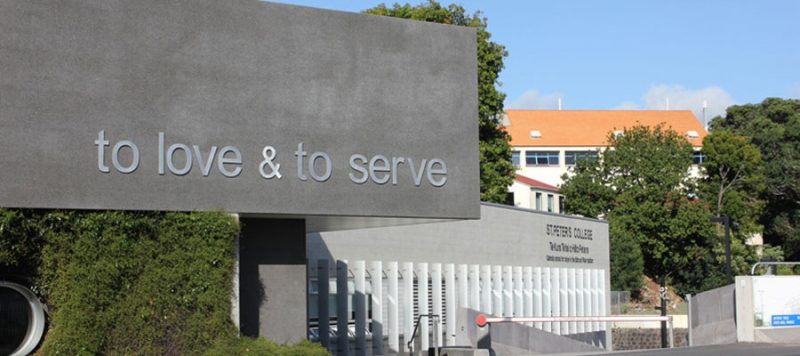By DR DAN STOLLENWERK
In the first year of his pontificate Pope Francis made news in an interview with the Jesuit journal La Civiltà Cattolica, by likening the Church to a field hospital. In part, he followed his simile with the following:
“Instead of being just a Church that welcomes and receives by keeping the doors open, let us try also to be a Church that finds new roads, that is able to step
outside itself and go to those who do not attend Mass, to those who have quit or are
indifferent. The ones who quit sometimes do it for reasons that, if properly understood and assessed, can lead to a return. But that takes audacity and courage.”
There exists for the New Zealand Catholic Church an obvious way of finding
new roads, of stepping outside the parish and approaching those who do
not attend Mass: the Catholic high school.
It may be time to think of developing the Catholic high school into a mission
of the parish.
There was some resistance when Catholic schools began to develop sacramental
programmes for their unbaptised, unconfirmed and/or uncommunicated students. By now, however, most would accept that the need was there and had to be answered. For many students, their only contact with the Church is through
the school. Though their grandparents may go to Mass, their parents do not.
(In fact often the grandparents pay the school fees.)
It is far past the time to reach out to those parents who do not attend Mass,
those who have quit or are indifferent. The harvest is great, but the labourers must be convinced.
Catholic high school principals and their senior leadership teams, for example,
must recognise that the Catholic high school is first and foremost Church. Their
particular charism may be education in the Judeo-Christian tradition, but their
first priority, like that of all the Church, as St Luke would say, is to witness to Jesus
to the ends of the earth.
Given this priority of witness, the school can then direct its resources toward
the evangelisation of the students, their parents and ultimately society.
Departments of music, art and literature, for example — as well as that of religious education itself — have a great choice in performance and study. The arts could
and should begin to recover for their students the great Judeo-Christian traditions
in their respective fields.
In addition to this greater schoolwide turn toward a more holistic Judeo- Christian education, however, parishes should also come on board. The school and the parish should cooperate to the benefit of both.
And the cornerstone of this cooperation should be the celebration of Mass every Sunday at the school.
Such a eucharistic celebration outside the parish is neither new nor radical. Certainly
mission parishes are not new. They exist in New Zealand and in many countries
are the norm for most Catholics.
But even outside of missions, nonparish eucharistic celebrations have always been common. Monasteries have both evangelised and served the needs of local communities for centuries. Newman Centres have done the same in the university setting for well over 100 years.
New eras produce new needs. Today, in New Zealand, one great evangelical need is the unchurched students and parents of Catholic high schools. Whether they eventually follow the model of a Newman Centre or that of a parish mission, Catholic high schools can and should be served with a weekly Sunday Mass.
A Sunday Mass at the school would involve otherwise unchurched students in the readings, the choir, the orchestra, ushering and serving. Other students would come to be with their mates. The various rites of the sacramental programme could take place at the weekend school Masses as well.
All such student participation would attract parents. Parents happily and proudly support their children, in sport, music and, as we have come to learn, in sacramental programmes and liturgical celebrations as well. In other words, student Masses will attract unchurched parents.
Several objections have been raised to weekend school Masses which should be considered. First, it has been said that students and parents should be going to their local parishes. Which, of course, is true. But they don’t. And so, as Pope Francis might say, we should consider stepping outside the parishes and approaching them where they are.
A second objection: Such school Masses may work for the time students are in school, but what about afterwards? Will the students and parents join the parish?
The answer, of course, is maybe not. Or maybe. But let’s find out. Evangelisation plants the seeds. It is true that some fall on rocky ground and pathways, but others might just fall on fertile soil.
A further objection: such a Mass may draw faith and talent away from the parishes;
some parents and students who do go to their parish may be attracted to the school Masses.
The objection must be taken seriously. Ideally, however, both school and parish will gain. With collaboration between the two, the vast potential of school music departments, for example, could be put at the service of the parishes. And evangelisation and formation programmes normally associated with a parish — Bible study, Marriage Encounter and the now highly successful “That Man Is You” — would find greater potential in the school.
The idea of putting all-too-scarce parish resources and personnel into school structures is risky. But difficult times call for difficult choices — or, as Pope Francis might say, audacity and courage.
Our parishes are increasingly grey, but hold fast to the faith. Our schools are increasingly vibrant, but falter in the faith. The two together could complement, synthesise, edify. The time is ripe for the parish to reach out to the school and for the school to become the new parish mission.
Dr Dan Stollenwerk is the head of the theology and philosophy faculty at St Peter’s College in Auckland.

Reader Interactions